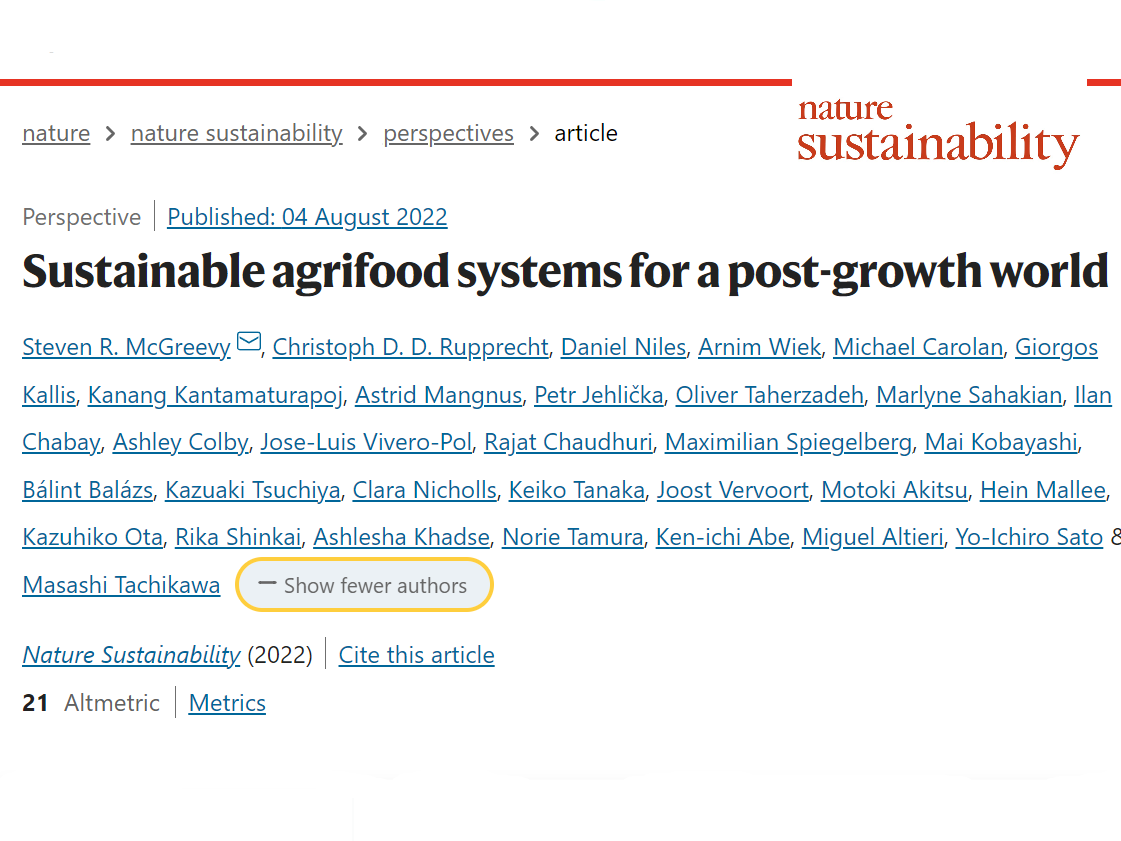The global food system is Exhibit A in the crisis of growth-addicted development. Exploitative of humans and animals, ecologically rapacious, hooked on fossil fuels, and controlled by a small number of multi-national corporations from food to fork, this system produces massive quantities of the wrong foods at incredible social, ecological and economic cost. With food crises again looming on the near horizon, a strategy to tweak and maintain the current growth-driven food system is highly questionable. In a new perspective paper published in Nature Sustainability, a team of 32 food system scholars provide the blueprint for something very different: sustainable post-growth food systems. Our senior researcher, Bálint Balázs is one of the authors.
“Sustainable Agrifood Systems for a Post-Growth World” describes food systems designed not by the logic of growth, but by principles of sufficiency, regeneration, distribution, commons, and care. Reviewing the vast and diverse experience of small-scale farmers, food cooperatives, home gardeners, alternative retailers, and other endeavors to re-claim food systems in high and low-income nations, this agenda-setting article offers a model for post-growth food systems. Rather than serving the endless pursuit of economic growth, it argues that food systems can instead be the foundation of healthy communities, ecologies and economies.
The authors call for policymakers, researchers and community groups worldwide to rethink their approach in developing new solutions beyond the current “growth paradigm.”
“We have seen what food systems designed to achieve relentless economic growth and profit maximization do to the environment, farming communities, and our health, and it’s not good,” says co-author Steven McGreevy from University of Twente’s section on Governance and Technology for Sustainability (CSTM). “Fortunately, there are countless examples from around the world of post-growth agrifood system elements in action. We need to support these models where they exist, and rediscover, transfer, or further develop them where appropriate.”
Some examples of post-growth agrifood system elements in action identified by the study’s authors include:
Food production – The adoption of agroecological farming and gardening into the current food systems can enhance biodiversity, maintain fertile soils, and improve system resilience to social and ecological shocks. Diversified small farms have shown that by working with nature and engaging with the complex relationships between plants, soils and pollinators, producers can produce higher yields while using land and water more efficiently than industrial agriculture.
Food business and trade – Community-based business models such as cooperatives and benefit corporations without profit-maximizing motives can anchor sustainability in businesses and prioritize the health and wellbeing of the environment and the public. A suite of tools and methods in alternative finance and investment such as crowdfunding schemes, ethical banks, credit unions, or impact investors can better align with smaller scale, community-oriented needs of agrifood systems.
Food culture – Closer relationships with food and the processes which it goes through to reach us can create a culture of appreciation in which we value food as a “commons” and the people working in the agrifood system. Often grounded in forms of spirituality and traditional ecological knowledge, a culture of care has been the backbone of traditional food cultures and agricultural heritage demonstrating collective agency rather than focusing on lone farmer, corporate or scientist heroes.
Food system governance – Agrifood system governance and institutions must bridge the institutional silos of agriculture, food economy, public health, education and development planning in pursuit of sustainable post-growth agrifood systems. Food policy councils (FPCs) are one example of such new governance structures. Ideally, FPCs are inclusive and representative of diverse public and private stakeholders and cut across multiple sectors of policy expertise related to food.
According to the study, the conventional wisdom of mainstream sustainability science–including its underlying logic of economic growth—is fixated on a narrow solution space: increasing production efficiency, high-tech innovation and individual behaviour change. In order to break free of these intellectual constraints, redesign of the global agrifood system should be supported by a coordinated education and a new research agenda that challenges conventional wisdom and focuses on understanding and developing diverse solutions outside of the growth paradigm. Exploring alternatives to this decidedly Western sustainability narrative is in fact one of the goals of the Research Institute for Humanity and Nature (RIHN), a national research institute located in Kyoto, Japan, and home of the FEAST research project from which this article emerged.
Led by McGreevy (also a visiting Associate Professor at RIHN), the author-team was assembled by the FEAST project for the 2021 RIHN International Symposium “Transitioning Cultures of Everyday Food Consumption and Production: Stories from a Post-growth Future”. Joint first-authors also include Associate Professor Christoph Rupprecht (Ehime University, Japan), Associate Professor Daniel Niles (Research Institute for Humanity and Nature, Japan), and Professor Arnim Wiek (Arizona State University).
